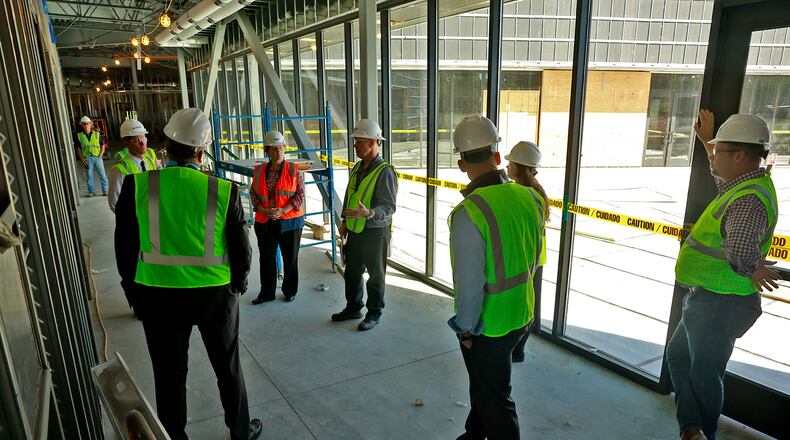Superintendent Bob Hill hopes every student leaving the district either enrolls in secondary education, gets employed with a living wage job or enlists. He said they sent out surveys asking community members what they felt needed to be improved.
“What does the business community need? We have a business advisory council. The ESC has a business advisory council that the rest of the county participates and help us shape those pathways to make sure that we’re not only meeting the industry credential needs, but also the day-to-day functioning needs of our students in your businesses, in your places of work,” he said.
Global Impact STEM Academy
Superintendent Josh Jennings said the school has an initiative to grow and serve more students.
“We’ve had a number of students that have not had the opportunity to be able to participate in the programing, just to limitations with facilities, capacity to be able to serve,” he said.
For help from the community, Jennings said they just want to continue to foster the relationships they already have that have helped them to get the point where they are now.
Greenon
Superintendent Darrin Knapke said officials there developed a new strategic plan three years ago after COVID to “bring the group back together again” that included 50 individual stakeholders in Greenon’s community. He said they sent out surveys to the community for what they felt needed to be improved and areas of focus.
The district has five areas of focus: student success, staff engagement, safety and wellness, school finance and resources, and communication and relationships.
Knapke said he put an administrator in charge of each one of the goals and meets with district leadership every two weeks to get updates based on the group. He said he wants the group to meet quarterly and present to the school board twice a year.
“I wanted to keep that (the strategic plan) at the forefront of our success, and having an administrator help lead that with staff members and community members, I feel has been beneficially important,” he said.
Clark-Shawnee
Superintendent Brian Kuhn said he wants people to know that the district is a community partner and wants to be a place where everyone learns every day.
Career and technical education school leaders at schools such as Springfield-Clark Career Technology Center and GISA said the district is growing and evolving.
CTC
Alicia Rittenhouse, communications coordinator, said most people may think of them as a school on Selma Road, but they also have a couple of satellite programs in the Clark-Shawnee and Northwestern school districts. They are looking to expand the program including at the next site in the Greenon district.
“What we hear from the business community regionally, locally is they want more skilled workers. They want workers especially with soft skills. We are working to not only train them with their career skills, but deliver on some of those soft skills as well,” she said.
Rittenhouse added that one of CTC’s initiatives is also reaching out to lower grades to do tours, career summer camps, career awareness through community events and programs, and career kits that are available at the library.
Jennings said career and technical education is evolving.
“I’ve seen it in a lot of different phases,” he said. “As it evolves ... I hope we’re (being more creative in our delivery) to some extent, certainly at Global Impact with how we’re trying to take a different approach or a unique approach to some aspects of it.”
Jennings also spoke about how the industry has helped them become more creative in terms of developing industry credentials for kids and show potential employers.
“There’s not a valuable industry credential for every single industry out there,” he said, explaining that for example, if you’re in auto technician at CTC, ASE certified, “that means something and it says something in terms of what it is that you are able to do and that you’ve been able to accomplish X, Y and Z.”
He said they work with the Ohio Department of Education and Workforce to come up with industry credentials specific to agriculture business and what students need to perform along the way, including the work requirements and technical skill attainment.
“That’s kind of how I see it changing and where I see it going,” Jennings said.
About the Author


